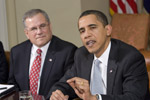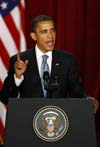Excellent Point by Rice
Susan Rice gets it exactly right in this passage of her testimony this morning: “the UN is being asked to take on harder, riskier operations—often without the support and capabilities it needs from member states. The Security Council has recently given some very ambitious mandates to peacekeeping operations in Africa, such as protecting civilians under the threat of physical violence—including sexual violence—in vast and populous territories with limited infrastructure, faltering peace processes, ongoing hostilities, and uncooperative host governments.” UN peacekeepers have not succeeded in Congo or Sudan because the Security Council and key member states have not allowed them to ...
Sudan on the Stand
A series of important hearings this week on Sudan. The full run down is here. This is a very important opportunity for members of Congress and the activist community to weigh in with their concerns about the Obama administration’s approach to Sudan. Over the last two months we have seen a series of conflicting signals from the administration on how it is approaching Sudan, and there are credible suggestions that there are some sharp divisions within the administration on how best to approach the issue. This has also bogged down the release of the long-anticipated Sudan policy review being conducted ...
The Time for Activism
A very good piece by Randy Newcomb on the Sudan movement in Foreign Policy. (In the spirit of full disclosure, Randy is president of Humanity United, which is a donor to Enough.) Randy honestly discusses some of the challenges and divisions regarding Sudan activism, while rightly noting that we face a series of crucial events in the next year and a half: “Exercising the political will necessary to craft a road map for lasting peace in Sudan will not come easily, nor will success. And that is precisely why the Darfur movement is needed now more than ever. Will it ...
Obama’s Africa Speech
I, like most, thought the Ghana speech was well crafted and delivered. Laura has already done a good post on the speech, but I was struck by one passage in particular of President Obama’s remarks: America has a responsibility to work with you as a partner to advance this vision, not just with words, but with support that strengthens African capacity. When there's a genocide in Darfur or terrorists in Somalia, these are not simply African problems - they are global security challenges, and they demand a global response. And that's why we stand ready to partner through diplomacy and ...
Pretzel Logic

A whopper of an op-ed by Andrew Natsios today, criticizing the Obama administration on Sudan. It is hard to know where to start. Perhaps the most egregious argument by Natsios is that: U.S. use of the term "genocide" is reducing our diplomatic options. In the face of genocide, the United States could hardly act as a neutral mediator. No politician wants to explain why he or she remained complacent in the face of slaughter. Hmmm. Perhaps Mr. Natsios, from his perch at Georgetown, has been having a bit of trouble recalling his own involvement on Sudan. The president under whom ...
Fallout
Apparently the noon press briefing at State was delayed considerably today as the powers that be tried to sort out what they were going to say about Darfur, and whether the situation still constitutes genocide. In remarks yesterday, Special Envoy Scott Gration suggested that we were seeing “remnants of genocide” in Darfur rather than ongoing genocide. Both President Obama and Ambassador Rice have recently characterized the situation as an ongoing genocide. State Department spokesman P.J. Crowley very carefully tried to put the horse back in the barn, noting: "[T]here is no question that genocide has taken place in Darfur. We ...
Gration’s Briefing: More Newsworthy Than He Hoped

I would imagine the goal of today’s press briefing by Special Envoy Scott Gration was simple: give a general, although bland, progress report on the state of talks and set the table for the conference on CPA implementation taking place here in Washington on June 23. Unfortunately, the special envoy strayed off the mark in several comments, and those missteps will likely dominate the news cycle up until the conference. When asked if the situation in Darfur currently amounted to genocide, he parsed his answer to indicate that “What we see is the remnants of genocide.” In a follow up ...
No Champagne Needed
As we noted previously in this blog, the U.N.’s top humanitarian official, John Holmes, recently announced that four of the international aid organizations expelled from Sudan in March would be allowed to resume operations in Darfur. This move has long been afoot, and the deal itself is distinctly underwhelming. Several concerns: First, the international community has essentially played along with Khartoum’s charade by agreeing to ‘rehat’ the four agencies under new names and new logos – rather than stick by the simple moral proposition that the people of Darfur have the right to unfettered humanitarian relief. Second, it seems abundantly ...
Kristof on Obama and Mamdani
A long and thoughtful piece by Nicholas Kristof in the New York Review of Books is most notable for two things. First, Kristof does an excellent job taking Mamdani apart piece by piece on many of the key arguments that Mamdani has floated to get his fifteen minutes of fame on the Darfur issue. Well worth a read for that reason alone. Equally notable, Kristof takes a reasonably sharp tone with regard to President Obama and Secretary Clinton's effort to resolve Sudan's long suffering: "Barack Obama and Hillary Clinton were among the leaders in the Senate calling for action on ...
Falling Short On Sudan

What was otherwise a very good speech in most respects by President Obama in Egypt fell very short on the Sudan side. Here is his reference to Sudan in the speech: For we have learned from recent experience that when a financial system weakens in one country, prosperity is hurt everywhere. When a new flu infects one human being, all are at risk. When one nation pursues a nuclear weapon, the risk of nuclear attack rises for all nations. When violent extremists operate in one stretch of mountains, people are endangered across an ocean. When innocents in Bosnia and Darfur ...

